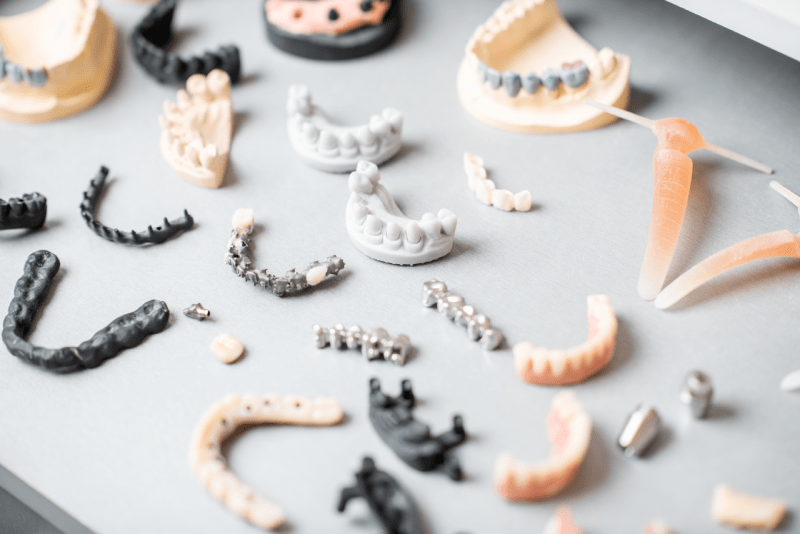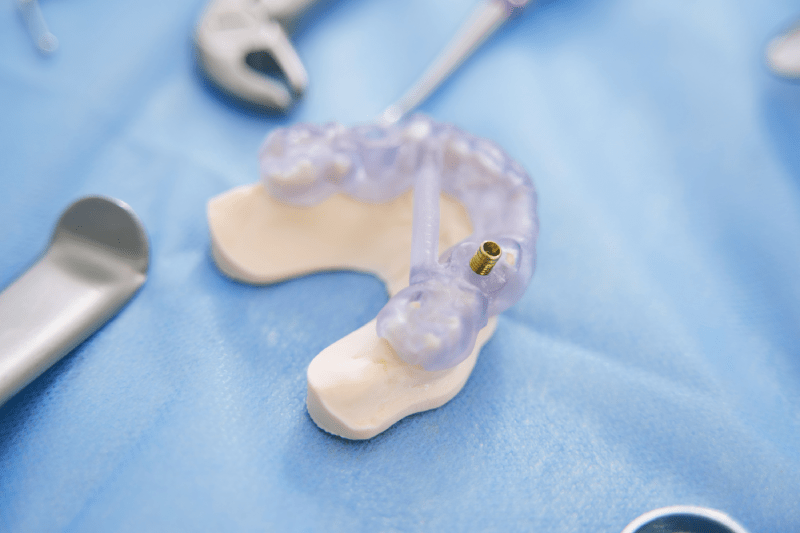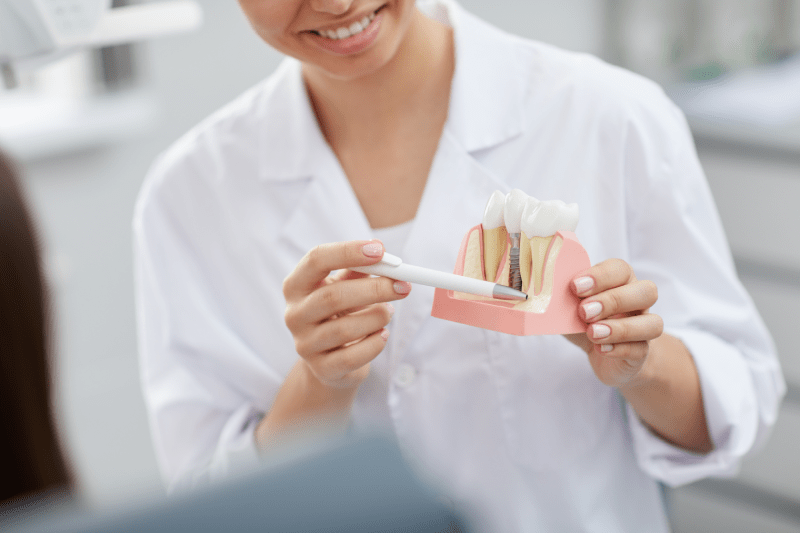What is a Dental Implant and in Which Cases is it Applied?
A dental implant is a bio-compatible artificial tooth root made of titanium, surgically placed into the jawbone to replace missing teeth. It is fundamentally composed of three main parts: the implant itself (the root-shaped screw) which is placed in the jawbone, the abutment (connector) that attaches to this root and holds the prosthetic, and the dental prosthesis (crown or bridge) placed on the abutment.
Implants not only address aesthetic concerns but also restore chewing function and prevent bone loss that can occur due to missing teeth. The most common application areas are:
- Single Tooth Loss: Replacing a single missing tooth with one implant and a crown placed on top, without damaging the adjacent healthy teeth.
- Multiple Tooth Loss: Completing the missing teeth with a bridge prosthesis placed on two or more implants.
- Complete Edentulism (Toothlessness): Securing a full-arch denture onto a small number of implants (for example, “All-on-4” or “All-on-6” concepts) in the jaw. This method frees patients from the necessity of using removable dentures.
- Supporting Removable Dentures: Using a few implants to increase the retention of removable dentures and enhance the patient’s chewing comfort.
How Do I Know If I Am a Suitable Candidate for a Dental Implant?
Whether a patient is suitable for an implant can only be determined by a detailed dental examination and diagnosis. The basic suitability criteria are as follows:
- Sufficient Jawbone Volume and Quality: Adequate bone thickness and density are critical for the implant to be securely anchored. This is evaluated by your dentist using a panoramic X-ray or a three-dimensional dental tomography (CBCT).
- Good General Health Status: Conditions such as uncontrolled diabetes, heart disease, or immune system disorders can negatively affect the healing process. Therefore, patients with chronic illnesses must consult with their doctor and get approval before treatment.
- Good Oral Hygiene: Consistent and meticulous oral care is essential for the long-term success of an implant. Dentists will often ask patients to improve their oral hygiene habits before the implant treatment.
- Smoking Habit: Smoking is a factor that seriously reduces implant success. Your dentist will recommend that you quit smoking before and after the operation.
How Long Does the Dental Implant Operation Take and Is It Painful?
The operation to place a single implant generally takes 15-30 minutes when performed by an experienced surgeon. This time may increase if multiple implants are placed or if additional surgical procedures (such as bone grafting) are required.
The procedure is typically performed under local anesthesia, so you will not feel any pain during the operation. You may only feel pressure and vibration. It is normal to experience some slight pain and swelling after the anesthesia wears off. This can be easily managed with pain medication prescribed by your dentist and cold compress applications to reduce swelling. The swelling is expected to peak in the first 48 hours and then subside.
What is the Success Rate of Dental Implants?
The overall success rate of dental implants is extremely high, generally over 95%. In the lower jaw, this rate can be as high as 98%, while it may be slightly lower in the upper jaw where bone quality is often less dense.
The most important factors affecting success are:
- The Dentist’s Experience: The correct positioning of the implant and the quality of the surgical technique.
- Bone Quality and Volume: How securely the implant integrates with the bone.
- Patient’s Oral Hygiene: Good care after the operation is essential to minimize the risk of infection.
- Smoking Habit: Smoking significantly increases the risk of failure.
What Are the Stages of Implant Treatment?
Implant treatment typically proceeds in two main stages: the surgical stage and the prosthetic stage.
- Examination and Planning: This is the most critical step of the treatment. Your dentist will perform a detailed evaluation of your mouth, jawbone, and overall health. The bone structure, sinus cavities, and nerves are analyzed with a three-dimensional tomography. This data is used to determine the most suitable location for the implant and to create a digital plan for the treatment.
- Surgical Operation: Under local anesthesia, a small incision is made in the gum, and a cavity is prepared in the bone where the implant will be placed, using specialized instruments. The implant is then meticulously placed into this cavity.
- Healing Period (Osseointegration): This is a waiting period for the implant to biologically fuse with the jawbone. This process allows the implant to become fully integrated into the bone. The healing time varies depending on bone quality and individual patient characteristics, but it generally takes 2 to 6 months.
- Abutment Placement: Once healing is complete, the abutment (connector) that will attach the prosthesis is placed on the implant. At this stage, a short period may be allowed for the gum tissue to shape around the abutment.
- Making the Permanent Prosthesis: Your dentist will take an impression of your mouth, and a custom-made aesthetic and functional dental prosthesis (crown, bridge, or denture) will be prepared in a dental laboratory. This prosthesis is then fixed to the abutment, completing the treatment.
What is the Lifespan of an Implant and How is it Maintained?
When placed correctly and maintained well, dental implants can be used for a lifetime. However, this longevity depends on regular and proper care, just like your natural teeth.
Implant care includes:
- Brushing: Brush around the implants and gums gently at least twice a day with a soft-bristled toothbrush.
- Flossing and Interdental Brushes: Use special implant floss or interdental brushes to clean food debris and plaque from between the implant and neighboring teeth. This is of vital importance to prevent infection around the implant.
- Professional Check-ups: Visit your dentist at least once a year to have your implants checked and professionally cleaned.
- Avoiding Bad Habits: Habits such as chewing on ice or biting hard objects can damage implants.
What Determines the Cost of a Dental Implant?
The cost of implant treatment varies depending on many different factors:
- Implant Brand and Quality: Internationally recognized and research-backed brands provide more reliable and successful outcomes, but they come at a higher cost.
- Number of Implants: The total cost increases as the number of implants used in the treatment increases.
- Additional Procedures: Extra surgical procedures such as bone grafting, sinus lifting, or soft tissue augmentation increase the cost in cases of bone deficiency.
- Type of Prosthesis: The type of prosthesis (crown, bridge, full denture) and the material it is made of (porcelain, zirconia) are other factors that affect the cost.
- Clinic and Dentist’s Experience: The quality of service offered by clinics and the experience of the dentist also play a significant role in pricing.

Is a Single Tooth Implant or a Bridge Better?
In the case of a single missing tooth, implant treatment is a superior option compared to a dental bridge.
- Advantages of an Implant:
- Does Not Harm Neighboring Teeth: An implant is placed directly in the missing tooth’s spot, so there is no need to cut or trim the adjacent healthy teeth. In bridge treatment, healthy teeth are trimmed to be used as support.
- Prevents Bone Loss: The implant stimulates the jawbone, keeping it alive and stopping the bone loss that results from a missing tooth root. A bridge cannot stop this bone loss.
- Longer Lifespan: With proper care, an implant can last a lifetime, whereas the average lifespan of a bridge is 10-15 years.
- Easier to Clean: A dental implant is cleaned just like a natural tooth. Cleaning under a bridge requires special tools.
What Are the Potential Risks and Complications After an Implant?
Dental implant treatment is a very safe procedure when performed by a specialist. However, as with any surgical procedure, some risks and complications exist:
- Infection: An infection can develop around the implant if proper hygiene is not maintained after the surgery.
- Peri-implantitis: This is the inflammation of the gum and bone around the implant. It can lead to implant failure and is often associated with poor oral hygiene or smoking.
- Nerve Damage: In rare cases, implants placed close to nerves in the lower jaw can cause temporary or permanent numbness in the lip, tongue, or chin area. This risk is minimized with modern imaging techniques.
- Failure of the Implant to Fuse with the Bone (Rejection): This is when the implant fails to integrate with the bone. It is usually caused by inadequate bone quality or the patient’s biological makeup. Failed implants can typically be easily removed and replaced with a new one.
What Materials Are Used in Implant Treatment?
The main material for implants is titanium, the most bio-compatible metal with the body. The high strength and corrosion resistance of titanium make it an ideal material for implants. Pure titanium or titanium alloys (e.g., Ti6Al4V) are commonly used.
In recent years, zirconia (zirconium dioxide) implants have also started to be used for patients with metal allergies or those with high aesthetic expectations. Zirconia is a metal-free, white, and durable ceramic material. Abutments and top prostheses (crowns) are generally made from aesthetic and durable materials like porcelain, zirconia, or metal-porcelain.
What Should Be Paid Attention to After the Implant Operation?
To ensure the success of the operation and a comfortable healing process, some important rules should be followed:
- First 24 Hours: For the first 24 hours, avoid hot food and drinks, alcohol, smoking, and spitting. This can interfere with blood clotting.
- Diet: Stick to soft and warm foods for the first week after the operation.
- Hygiene: Do not brush the implant area for the first 24 hours. In the following days, clean the area with a soft toothbrush and special mouthwash as recommended by your dentist.
- Cold Compress: Apply a cold compress to the outside of your face in 10-minute intervals to reduce swelling.
- Medication: Take the antibiotics and pain medication prescribed by your dentist regularly.
- Physical Activity: Avoid strenuous exercise for the first few days.
Do Smoking or Alcohol Use Affect Implant Success?
Yes, both smoking and alcohol can seriously and negatively affect implant success.
- Smoking: Cigarettes contain nicotine which constricts blood vessels in the mouth, slowing down the healing process. It also weakens the immune system, increasing the risk of infection and making it difficult for the implant to fuse with the bone.
- Alcohol: Excessive alcohol consumption can slow down the healing process and affect blood clotting. Therefore, it is recommended to avoid alcohol for the first few days after the operation.
Can Implants Be Applied to Patients with Bone Resorption?
Yes, implant treatment can be applied even to patients who lack sufficient bone volume. In such cases, additional surgical procedures like bone grafting (adding synthetic or natural bone substitute) or sinus lifting (elevating the sinus cavity in the upper jaw) are performed before implant placement. These procedures aim to create a solid foundation to support the implant.
Is There an Age Limit for Getting a Dental Implant?
There is no upper age limit for dental implants; what is important is that the patient’s overall health is suitable for the operation. However, there is a lower age limit, as the jawbone must have completed its development. This is generally considered to be 18 years of age or older.
What Are Implant-Supported Prostheses and How Are They Made?
Implant-supported prostheses are artificial teeth placed on the implant to restore aesthetics and function. There are two main types:
- Screw-Retained Prostheses: These prostheses are secured to the implant with a screw. They are easy to remove and reattach, which is an advantage for future repairs.
- Cement-Retained Prostheses: These prostheses are cemented onto the implant with a special adhesive.
During the fabrication process, an impression of the mouth is taken, and an aesthetic and functional prosthesis is custom-made from materials like porcelain, zirconia, or hybrid materials in a laboratory.
Is the Brand or Origin of the Implant Important?
Yes, the brand and origin of the implant are extremely important. There are many implant brands on the market. High-quality, internationally recognized brands are backed by years of scientific research and clinical studies. These brands offer reliability in terms of titanium quality, surface characteristics, and long-term success. Cheap and unbranded implants can increase the risk of failure and lead to issues with future part availability.
In Which Cases Should Implant Treatment Be Postponed?
In some situations, it may not be appropriate to start or continue implant treatment:
- Uncontrolled Chronic Illnesses: Conditions such as uncontrolled diabetes, severe heart disease, or blood clotting disorders.
- Pregnancy: Implant surgery is generally postponed during pregnancy.
- Active Oral Infection: Gum inflammation or infections in the jawbone must be treated first.
- Use of Certain Medications: Some medications, such as bisphosphonates, which affect bone metabolism, can negatively impact implant treatment.

How Is Implant Treatment Applied in Fully Edentulous Mouths?
In a fully toothless jaw, modern implant concepts like All-on-4 or All-on-6 are applied. These methods involve placing only four or six implants strategically to support a full arch. This allows the patient to get a fixed prosthesis in a short amount of time. This approach is more economical because it uses fewer implants and generally eliminates the need for bone grafting.
How Is Anesthesia Administered During Dental Implant Surgery?
The operation is usually performed under local anesthesia. This means only the area to be operated on is numbed, and the patient remains conscious. For patients who are very anxious or for complex and lengthy operations, conscious sedation (where the patient is in a semi-conscious state) or general anesthesia may be preferred.
What Is the Importance of Check-ups After Implant Treatment?
The success of implant treatment does not end with the operation. Regular follow-ups and check-ups are of vital importance for the long-term health of the implant. During these check-ups, your dentist will:
- Examine the condition of the implant and the surrounding gum tissue.
- Look for signs of peri-implantitis (inflammation around the implant).
- Check the stability and occlusion (bite) of the prosthesis.
- Perform a professional cleaning to remove plaque and tartar if necessary.
These regular check-ups allow for the early detection and intervention of potential problems, thereby extending the life of the implant.
Choosing a Dental Implant Clinic in Swansea: What to Consider?
Choosing the right clinic for dental implant treatment in Swansea is crucial for a successful outcome and a smooth experience. Here are some key points to consider: Expertise and Experience, Technology and Equipment Used, Sterilization and Hygiene. Dental implant treatment requires special expertise. The experience and success of the dentist performing the treatment are very important. It’s beneficial to review the clinic’s past cases, read patient reviews, and inquire about the dentist’s relevant education and certifications. Modern dental implant treatments have become safer and more comfortable thanks to advanced technology and equipment. The modernity of the technologies (3D tomography, CAD/CAM technology, etc.) and equipment used by the clinic directly affects the quality of the treatment. The sterilization and hygiene standards of the clinical environment are vital for minimizing the risk of infection. It’s advisable to check the clinic’s procedures and certifications in this regard.
Dental Implant Treatment Process in Swansea
The dental implant treatment process typically consists of several stages: Initial Examination and Planning, Surgical Phase, Healing Process, Prosthesis (Crown) Placement. Your dentist will examine your oral structure and assess your overall health. Using imaging techniques like 3D tomography, the condition of your jawbone is analyzed, and a personalized treatment plan is created for you. During this phase, the implant (artificial tooth root) is placed into the jawbone under local anesthesia. This procedure is usually painless. A few months are waited for the implant to fuse with the jawbone (osseointegration). This process is necessary for the implant to form a solid foundation. After the implant has fully fused with the jawbone, an abutment, which is a connecting piece, and the artificial tooth (crown) are placed on top of it.
Cost of Treatment and Payment Options
The cost of dental implant treatment in Swansea varies depending on the type of implant used, any additional procedures needed (such as bone grafting), and the clinic’s pricing policy. Generally, the cost includes: The implant itself, Surgical procedure fee, Cost of the artificial tooth (crown) and abutment, Initial examination, imaging, and follow-up appointments. Depending on the clinic, payment options may also vary. Some clinics may offer discounts for upfront payments, while others may provide installment plans or financing options. It is important to get detailed information about the cost and payment options with your clinic before starting the treatment.
Different Types of Implants in Swansea
Dental implants differ based on the material and design used. Clinics in Swansea may typically offer the following types of implants: Endosteal Implants and Subperiosteal Implants. Endosteal implants are the most common type of implant, placed directly into the jawbone. They are made of titanium or zirconia. Subperiosteal implants are placed on top of the jawbone, under the gum tissue. They can be an alternative for patients who do not have sufficient jawbone. Titanium or zirconia are commonly used as implant materials. Titanium is the most preferred due to its biocompatibility and strength. Zirconia is an aesthetic, metal-free option.
Technologies and Equipment Used in Implant Treatment in Swansea
The technologies used in modern implant treatment improve the success and comfort of the procedure. Advanced clinics in Swansea often use these technologies: 3D Imaging (CBCT), Computer-Assisted Implant Guidance, and CAD/CAM Technology. 3D imaging provides a detailed three-dimensional image of the jawbone, helping to determine the most suitable position for the implant. Computer-assisted implant guidance allows surgical guides (templates) to be prepared using 3D imaging data. This allows the implant to be placed with precision and safety. Thanks to CAD/CAM technology, the artificial tooth (crown) to be placed on the implant can be produced quickly and accurately in the clinic’s own laboratory. The expertise and experience of your dentist in Swansea are the most crucial factors for the success of the treatment process. Getting detailed information about the technologies offered by the clinic and the dentist’s background in this field will help you make the right decision.
Swansea and Turkey: A Comparison of Dental Implant Treatment
Dental implant treatment is a modern and effective solution for replacing missing teeth. For patients considering this treatment in both Swansea and Turkey, there are some important differences and similarities. Here is a comparison in terms of cost, quality, and process:
Cost and Economic Differences
- Turkey: Turkey is considered one of the most affordable countries for dental implant treatment worldwide. Due to lower labor and operational costs, it is possible to receive high-quality service at a much lower cost compared to a clinic in Swansea. This price difference often makes the total cost more economical, even when accounting for travel and accommodation expenses.
- Swansea: Dental implant treatment in Swansea is aligned with prices across the United Kingdom and is higher than in Turkey. The high cost is generally due to local living standards, operational expenses, and insurance systems.
Quality and Standards
- Turkey: Many clinics in Turkey provide services at international standards and use state-of-the-art equipment. Many experienced dentists from Europe and the U.S. specialize in aesthetic dentistry and implantology. However, not all clinics are of the same quality. Therefore, it is important to thoroughly research the clinic’s and dentist’s references, certifications, and experience before starting treatment.
- Swansea: Dental clinics in Swansea operate under the United Kingdom’s strict health regulations and standards. This provides an assurance of the quality and reliability of the treatment. Dentists are generally highly educated and experienced. However, waiting times and appointment processes may not be as flexible as in Turkey.
Process and Travel
- Turkey: Dental implant treatment in Turkey is often offered as part of “health tourism.” This means that the treatment plan is made according to the patient’s travel schedule. Typically, the first visit is for the surgical procedure, and the second visit is for placing the prosthesis (crown) after the healing process. This process may require two separate trips, each lasting a few days to a week. Clinics can also assist with logistics such as accommodation and transfers.
- Swansea: The treatment process in Swansea follows a more traditional approach. Appointments are scheduled according to the patient’s local life and schedule. There are no additional costs such as travel and accommodation. However, the treatment process may be spread over a longer period.
Conclusion
Both countries have unique advantages for dental implant treatment. Swansea is ideal for those seeking a more traditional treatment process, secured by local and strict regulations. Turkey is an attractive option for those looking for cost-effective and high-quality treatment. Patients who are flexible with their travel and treatment planning can benefit from the economic advantage in Turkey.
Before making a treatment decision, it’s important to carefully consider both options based on your specific needs, budget, and priorities. For detailed information about the clinic and dentist, please contact us at Cure Holiday for an online consultation.
The UK and Turkey: A Comparison of Dental Implant Packages
Dental implants offer a permanent and aesthetic solution for replacing missing teeth. However, the cost of this treatment and the services provided vary greatly from country to country. The United Kingdom and Turkey are two frequently compared destinations for those seeking dental implant treatment. Let’s compare the packages offered by these two countries and see why Turkey stands out as a superior option.
Dental Implant Packages in the United Kingdom
In the UK, dental implant treatment is generally very expensive. Packages typically cover the cost of a single implant, with additional fees for extra procedures (such as bone grafting or sinus lifting). Getting a dental implant in the UK can be quite costly, depending on the type of implant, the location of the clinic, and the dentist’s experience.
- Cost: The cost of a single dental implant in the UK typically ranges from £2,500 to £4,000, depending on the additional services included in the treatment. This price usually includes the consultation, surgical procedure, and the implant itself.
- Treatment Process: The treatment is often completed in several stages, with separate appointments scheduled for each. This can create logistical challenges, especially for patients living in different cities.
- Package Content: Packages are generally very basic and do not include extra services like accommodation or transportation. Patients have to cover all these expenses on their own.
Dental Implant Packages in Turkey
In recent years, Turkey has become a globally popular hub for dental tourism. The main reason for this is that it offers services of Western standards at much more affordable prices. Dental clinics in Turkey offer comprehensive packages designed to meet all the needs of the patient.
- Cost: The cost of a single dental implant in Turkey is typically 50% to 70% of the price in the UK. This provides a significant cost advantage, especially when the number of implants increases.
- All-Inclusive Packages: Clinics in Turkey offer all-inclusive packages that cover not only the implant treatment but also accommodation, airport transfers, and translation services. Thanks to these packages, patients only have to worry about traveling comfortably.
- Fast and Effective Treatment: Most clinics in Turkey use the latest technology to complete implant treatment in a shorter time. In many clinics, it’s possible to have the surgical placement of the implant and the fitting of temporary teeth on the same day, which helps patients optimize their travel time.
Why You Should Choose Turkey?
The advantages of choosing Turkey for dental implant treatment are not limited to the lower cost. Dentists in Turkey are highly qualified and have international experience. The materials and technologies used are of the same high quality as those in the UK, but the overall cost of treatment is much lower.
In summary, while getting a dental implant in the UK can be a high-cost and logistically challenging process, Turkey offers both an affordable and comfortable experience. Clinics in Turkey plan the entire treatment process from start to finish, meeting all the needs of their patients and providing them with the best service. If you are looking for high-quality dental implant treatment without straining your budget, Turkey is the most logical and attractive option.



